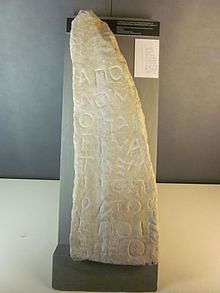Sostratus of Aegina
Sostratos of Aegina (Greek: Σώστρατος ὁ Αιγινήτης), son of Laodamus, is reported by Herodotus as a famous merchant in the sixth century BC Hellenic world[1] - indeed to have gained "the biggest profit any Greek trader we have reliable information about has ever made from his cargo".
[2] The veracity of Herodotus has often been challenged, both in ancient and modern times, and the instance of his casual reference to Sostratus as a well known presence is something of a test case.
[4] The names of Sostratus and Laodamus – perhaps his grandfather and father – have been found in Egypt,[5] supporting the view of his coming from an important family of international Aegina traders.
Moreover, clay storage jars are found throughout Etruscan archaeological sites of the period marked with the Aeginetan letters "SO", which may have stood for Sostratos, and are often presumed to be the packaging in which his goods were delivered.
[6] Not all scholars, however, accept that the marks on these jars refer to the Sostratos of Herodotus,[7] and they (like the anchor) may again attest only to the kindred network, not the man.
